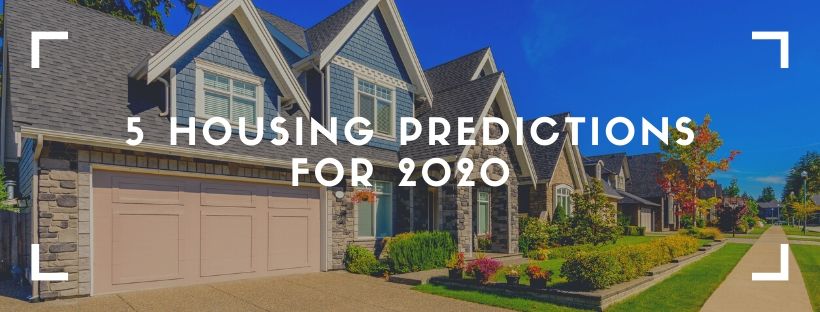
Throughout 2019 interest rates dropped dramatically and the market started to heat up throughout the country. So what should we expect in 2020? Many economists predict that the market will remain relatively stable throughout 2020 but for more specifics, here are five housing predictions for 2020.
#1. An increase in rental prices will lead to more millennial homebuyers.
Over the last 10 years, we’ve seen some contradictory opinions on whether millennials really want to own but the general consensus says yes. 70% of millennials say that they would be willing to cut back on activities and extracurricular activities, so to speak, in order to save money and buy a home according to a Chase Home Lending study. One major factor holding back millennials from homeownership is the inventory. In some of the hottest markets in the country, inventory remains relatively low, which increases home values and competition is high making it difficult for first-time homebuyers like millennials.
But, this also dries up the rental prices and when millennials realize that they could be spending the exact same amount on a home mortgage as their monthly rental payment, they’re more inclined to start putting money away on their own property rather than their landlord’s.
#2. Baby boomers may sell their homes at a faster pace.
Zillow recently conducted a study that showed the baby boomers are preparing to sell their homes to the tune of 27% of the homes in this country. These sellers will seek newer, low maintenance homes so these larger homes will now be available to those moving up. This should also help the inventory pipeline problem that we currently have.
#3. New construction is on the rise.
We are still seeing a shortage from the 2007 and 2008 housing recession where construction took a nosedive and we haven’t completely recovered from the lack of inventory. Most economists feel that in 2020 the housing market for new construction will boom and the National Association of Home Builders reported the highest level of homebuilder confidence in 20 years. According to Fannie Mae, new housing starts are expected to reach their highest levels since 2007, which dates back to the start of the housing crisis. However, this isn’t to scare you because interest rates are low, there’s no predatory lending going on, and the Federal Government is keeping a close eye on the balance of the market.
#4. Growth rates may slow.
Home values may continue to increase but the growth rate may slow slightly. “According to the S&P Core Logic Case Shiller Home Price Index, which tracks US residential real estate prices, noted a year-over-year increase of 3.3% as of October 2019 and a suggested similar trajectory for 2020.” This means that homebuyers should probably not wait too long in 2020 to buy a home as their likely to get a better deal now than six months from now.
#5. Gentrification will continue in fast-growing cities.
Socioeconomic and racial dynamics will continue to persist in urban cores of America’s fastest-growing cities such as Washington DC, Atlanta, and Philadelphia. Many city planners agree that some forms the gentrification have yielded positive results for citizens of larger cities where impoverished communities were previously stuck in neutral for decades.
Homebuyers can expect the housing market to remain stable, as I said from the beginning throughout 2020. Lenders, real estate agents, builders, and economists alike all agreed that this will be a great year for the housing market even throughout the election. Unemployment is at record lows and consumer sentiment is near all-time highs so it’s unlikely that the housing market will suffer a downturn in 2020. [Forbes]
